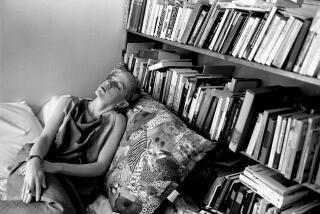Seeking Divine Intervention : Violence: Increasingly, women are asking their churches and synagogues to break the historic pattern and treat domestic abuse seriously.
A woman with seashells in her elaborate hair enters the circle. Her voice is as soothing as ocean waves. She says, “I am Ntombi, a recovering addict, alcoholic, batterer and batteree. I’m your facilitator.”
The 30 other people in the circle quietly take that in. They all live with domestic violence. Most of them have been ordered into counseling by the courts.
But it is here that they have chosen to come--to the domestic violence program at Glide Memorial Church in downtown San Francisco.
While churches and synagogues seem the natural place to turn for shelter, many offer little or no help. Glide is a rarity. As violence against women faces the glare of public exposure, religious congregations are being challenged to take up the cause.
“In history, churches have not done a very good job,” says Pamela Cooper-White, an Episcopal minister and psychotherapist in Park Ridge, Ill., who advises clergy to print crisis hot-line numbers in the church bulletin, invite experts to talk to the congregation, organize prevention programs for teens.
Most religious congregations have a domestic violence policy that falls under pastoral counseling. Anyone with a personal problem is entitled to private sessions with clergy, whether the issue is serious or relatively silly.
Religious leaders also tend to shy away from direct involvement with domestic violence recovery programs, in part because the problem is still seen as a private matter between a husband and a wife.
“Convey the message: It’s not taboo to talk about this,” says Cooper-White, author of the new book, “The Cry of Tamar: Violence Against Women and the Church’s Response” (Fortress Press). In the Bible, Tamar--daughter of King David--is one of several women whose stories uncover the ancient roots of the problem.
She is betrayed, raped and rejected. Her story is no worse than that of Hagar, the slave made surrogate mother of Ishmael. Other wives, servants and obedient daughters suffer abuse, and aren’t even called by name.
With so many stories about battered women in the Bible, you’d think religious leaders would be jolted into an active interest. But more often, the largely male clergy avoids the subject, Cooper-White and others charge.
As a result, more women are taking matters into their own hands. “Violence against us is a concern that cuts across all cultures and economic circumstances,” says Delores Williams, a consultant for the World Council of Churches, an interdenominational clearinghouse.
A professor of theology and culture at Union Theological Seminary in Manhattan, Williams pioneered the reform movement by womanist (African American) and feminist scholars to search the Bible’s violent texts and find some redemptive message for women. Her book “Sisters in the Wilderness” (Orbis Books, 1993) recasts Hagar as a survivor, not a victim.
Finding ways to get free of spousal abuse is women’s work, Williams believes. “In the black churches, 85% of members are women,” she says. “We need to pool our resources. That way, we can make a difference.” Her model is the social service programs created by black churches during the slavery era to help church members in hard times. She says women need to be computer-literate--go online, share information about goods and services, problems and solutions.
*
Ironically, increased vigor among religious leaders may be a mixed blessing.
“The purpose of pastoral counseling is to preserve a woman’s faith. It has nothing to do with preserving her safety,” says Gail Pincus, a clinical psychologist who directs the Domestic Abuse Center in Northridge. “I don’t advocate keeping a woman apart from her religious faith--that support system is crucial. But the clergy need appropriate training.”
Others are concerned that the clergy are not so much unskilled as they are emotionally incapable. Like the rest of us, they are paying the price for dysfunctional family life. “We are in an era when the leadership of our churches is significantly wounded,” says Eldon Olson, director of Consultation to Clergy, an office of the Evangelical Lutheran Church of America in Seattle.
And of those clergymen and women who were abused as children, many are not far enough along with their own recovery to effectively help others, Olson says. He has seen domestic violence victims turn to a pastor for help and get propositioned.
“We’re very concerned that the battered who turn to religious leaders get help, not further harm,” says Marie Fortune, director of the Center for Prevention of Sexual and Domestic Violence, also in Seattle. A United Church of Christ minister, she trains clergy around the country to handle problems of abuse. Rather than give crash courses in therapy skills, Fortune teaches how to assess situations and build networks of professional referrals in the community.
*
That would be an improvement over some traditional church counseling programs. “In regular churches, you’re hiding what’s going on in your family,” says Robin, who is in the Glide program but still lives in an abusive relationship with another man. (Violence in gay and lesbian relationships is more than twice as common as it was five years ago.)
“When I was younger, my father beat us,” says Robin, who asked that his last name not be used. “We went to family counseling and sat alone in my pastor’s office. I didn’t feel as if there was anybody who understood me.”
Some ministers seem to do better.
Ann, who asked that her real name not be used, compares her pastor to Moses. “He led me out of slavery in Egypt to freedom,” says Ann, a Los Angeles businesswoman and battered wife now living in a shelter. Conversations with her pastor helped her face her abusive husband. When she was ready to leave home, the pastor gave her the names of shelters. She came to Good Shepherd, an independently run shelter within the Catholic Archdiocese of Los Angeles.
Many shelters with religious affiliation say they do not offer prayer or spirituality programs so as to qualify for government aid. At Good Shepherd, which houses up to 12 women and their children, prayer and spiritual exploration are encouraged. The program also offers job training and legal counsel. There is a nondenominational school for the children, grades kindergarten through junior high.
“There is no interaction with the men of these families, because the men are in denial, or of criminal intent,” explains Sister Eileen Robinson, the director. “The women and children are in hiding.”
At Glide, however, the violent and their victims are counseled together, a practice discouraged by many in the field.
“We’re not about anonymity. We’re about telling it all, breaking through the shame, feeling accepted,” says Janice Mirikitani, who oversees about 35 social outreach programs at Glide, a nationally known Methodist church where poet Maya Angelou, the Rev. Jesse Jackson and President Clinton are among the faces in the snapshot gallery.
The program is open to the 6,000-member congregation, as well as outsiders. Meetings are held in the church. Graduates of the 12-week session are the center of attention at a Sunday worship service. While Glide’s program does not meet state requirements for counseling those convicted of domestic violence, it does meet requirements for “civil compromise” cases, which are lesser offenses.
“For anyone who’s been through the court, Glide is not a certified program, but that’s not to say it isn’t a good program,” says Barbara Brooten, supervising probation officer for San Francisco. “Glide is excellent.”
*
Every day in this country, four women die as a result of domestic violence, according to a 1994 U.S. Department of Justice survey. Conservative estimates are that 2 million to 4 million women are battered each year. Yet, in many instances, charges are not filed.
Renita Weems, a professor at Vanderbilt Divinity School in Nashville, Tenn., says she learned a lesson from the O.J. Simpson murder trial that she uses in her preaching classes.
Society is still willing to live with marital violence, Weems says. The time has come to face it and start negotiating for better.
“Are there circumstances where violence against a spouse is acceptable?” she asks. “It seems we think there are. Then let’s air the subject from the pulpit, Sunday mornings.”
More to Read
Sign up for our Book Club newsletter
Get the latest news, events and more from the Los Angeles Times Book Club, and help us get L.A. reading and talking.
You may occasionally receive promotional content from the Los Angeles Times.






